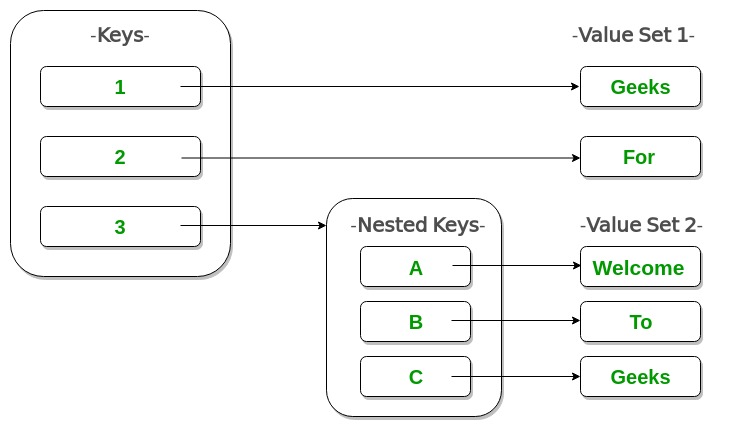how to create a nested dictionary in python
Prerequisite – Python dictionary
A Dictionary in Python works similar to the Dictionary in the real world. Keys of a Dictionary must be unique and of immutable data type such as Strings, Integers and tuples, but the key-values can be repeated and be of any type.
Attention geek! Strengthen your foundations with the Python Programming Foundation Course and learn the basics.
To begin with, your interview preparations Enhance your Data Structures concepts with the Python DS Course. And to begin with your Machine Learning Journey, join the Machine Learning - Basic Level Course
Nested Dictionary: Nesting Dictionary means putting a dictionary inside another dictionary. Nesting is of great use as the kind of information we can model in programs is expanded greatly.
nested_dict = { 'dict1' : { 'key_A' : 'value_A' },
'dict2' : { 'key_B' : 'value_B' }}

Dict = { 1 : 'Geeks' , 2 : 'For' , 3 : { 'A' : 'Welcome' , 'B' : 'To' , 'C' : 'Geeks' }}
Creating a Nested Dictionary
In Python, a Nested dictionary can be created by placing the comma-separated dictionaries enclosed withing braces.
Dict = { 'Dict1' : { },
'Dict2' : { }}
print ( "Nested dictionary 1-" )
print ( Dict )
Dict = { 'Dict1' : { 'name' : 'Ali' , 'age' : '19' },
'Dict2' : { 'name' : 'Bob' , 'age' : '25' }}
print ( "\nNested dictionary 2-" )
print ( Dict )
Dict = { 'Dict1' : { 1 : 'G' , 2 : 'F' , 3 : 'G' },
'Dict2' : { 'Name' : 'Geeks' , 1 : [ 1 , 2 ]} }
print ( "\nNested dictionary 3-" )
print ( Dict )
Output:
Nested dictionary 1- {'Dict1': {}, 'Dict2': {}} Nested dictionary 2- {'Dict1': {'name': 'Ali', 'age': '19'}, 'Dict2': {'name': 'Bob', 'age': '25'}} Nested dictionary 3- {'Dict1': {1: 'G', 2: 'F', 3: 'G'}, 'Dict2': {1: [1, 2], 'Name': 'Geeks'}} Adding elements to a Nested Dictionary
Addition of elements to a nested Dictionary can be done in multiple ways. One way to add a dictionary in the Nested dictionary is to add values one be one, Nested_dict[dict][key] = 'value'. Another way is to add the whole dictionary in one go, Nested_dict[dict] = { 'key': 'value'}.
Dict = { }
print ( "Initial nested dictionary:-" )
print ( Dict )
Dict [ 'Dict1' ] = {}
Dict [ 'Dict1' ][ 'name' ] = 'Bob'
Dict [ 'Dict1' ][ 'age' ] = 21
print ( "\nAfter adding dictionary Dict1" )
print ( Dict )
Dict [ 'Dict2' ] = { 'name' : 'Cara' , 'age' : 25 }
print ( "\nAfter adding dictionary Dict1" )
print ( Dict )
Output:
Initial nested dictionary:- {} After adding dictionary Dict1 {'Dict1': {'age': 21, 'name': 'Bob'}} After adding dictionary Dict1 {'Dict1': {'age': 21, 'name': 'Bob'}, 'Dict2': {'age': 25, 'name': 'Cara'}} Access elements of a Nested Dictionary
In order to access the value of any key in nested dictionary, use indexing [] syntax.
Dict = { 'Dict1' : { 'name' : 'Ali' , 'age' : '19' },
'Dict2' : { 'name' : 'Bob' , 'age' : '25' }}
print ( Dict [ 'Dict1' ][ 'name' ])
print ( Dict [ 'Dict2' ][ 'age' ])
Output:
Ali 25
Deleting dictionaries from a Nested Dictionary
Deletion of dictionaries from a nested dictionary can be done either by using del keyword or by using pop() function.
Dict = { 'Dict1' : { 'name' : 'Ali' , 'age' : 19 },
'Dict2' : { 'name' : 'Bob' , 'age' : 21 }}
print ( "Initial nested dictionary:-" )
print ( Dict )
print ( "\nDeleting Dict2:-" )
del Dict [ 'Dict2' ]
print ( Dict )
print ( "\nDeleting Dict1:-" )
Dict .pop( 'Dict1' )
print ( Dict )
Output:
Initial nested dictionary:- {'Dict2': {'name': 'Bob', 'age': 21}, 'Dict1': {'name': 'Ali', 'age': 19}} Deleting Dict2:- {'Dict1': {'name': 'Ali', 'age': 19}} Deleting Dict1:- {} how to create a nested dictionary in python
Source: https://www.geeksforgeeks.org/python-nested-dictionary/
Posted by: tranwastookey.blogspot.com

0 Response to "how to create a nested dictionary in python"
Post a Comment